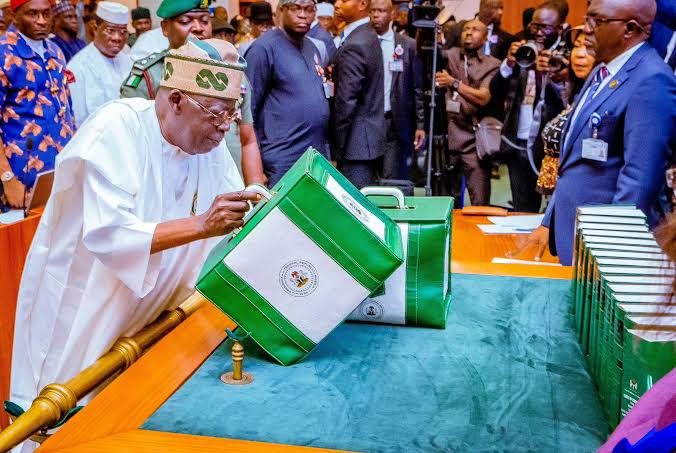Independent Media and Policy Initiative (IMPI), a think tank, has praised the federal government for devoting more funding to capital spending than recurring components in the 2024 budget for the first time since the return of democratic governance in 1999.
It stated in a statement issued by its chairman, Niyi Akinsiju, that the choice to deviate from a 24-year pattern with the 2024 budget demonstrates the government’s commitment to driving real economic growth.
The National Assembly adopted a N28.7 trillion budget for the 2024 fiscal year, with N9.99 trillion earmarked for capital spending and N8.76 trillion for non-debt expenditure.
According to the policy think tank, the N28.7 trillion spending plan, which tries to remedy years of budget imbalance between capital and recurring expenditures, provided numerous benefits.
IMPI stated that a budget with more capital investment than recurrent expenditure is not only a driver of economic growth but also has an impact on the quality and style of life of individual citizens.
“In this regard, we agree with the Nigerian Institute of Social and Economic Research (NISER) 2019 argument that the only way to have a real impact on the economy is to monitor and assess monies set aside specifically for capital expenditure and capital projects.
“It appears, however, that the imbalance between capital and recurring spending has been eventually addressed. For the first time in the present democratic era, the 2024 budget, which is the first under President Bola Tinubu’s government, allocates more funding to capital spending than recurrent expenditure.
“The N28.777 trillion budget for the fiscal year 2024 includes N8.7 trillion in recurring expenditures and N9.9 trillion in capital expenditures.
“Given that what was enacted by the National Assembly was N1.28 trillion more than the original N27.5 trillion spending plan, there are definitely promising signals and possibilities for a budget that will be funded by N19.6 trillion in non-debt revenue and a deficit of approximately N9.18 trillion.
- ATTENTION: Techrectory gives ₦5,000 monthly to our top readers, CLICK HERE to become a winner.
“This is something to build on for an administration that has, since assuming office, embraced economic reforms that are not only courageous in the face of historical resistance to their implementation but are also expected to yield long-term transformative benefits to Nigerians.”
The group also criticized previous administrations for failing to capitalize on two oil booms to improve infrastructure development in the country through increased capital votes in annual budgets.
“According to World Bank data, the national economy grew at an average rate of 6 to 8 percent between 2006 and 2013, yet the increased revenue was spent on feeding state employees. In those years, recurrent expenses always exceeded capital spending allocations.
“Nigeria’s recurring expenditures, which include spending on human expenses such as pay and pensions, as well as overhead costs and service-wide votes, have consistently eaten up more than 65% of overall budgets and a significant portion of income.
“We find it even more distressing that, despite the incongruent financial imbalance, the country has been recording yearly budget deficits of N3.3 trillion since 2009, exacerbated by oil price volatility and post-COVID economic debilitations in recent years.
“According to Budget Office data, between 2011 and 2021, the Federal Government of Nigeria spent N29.3 trillion on non-debt recurrent expenditure and earned N33.2 trillion in income. This suggests that the amount invested in capital projects was absolutely small,” it stated.
However, IMPI is optimistic that cost-cutting measures authorized by President Tinubu will ensure that additional money is freed up for the capital component of the budget.
It stated: “In addition to this is the decision to implement Stephen Oronsaye’s 12-year-old report on public sector reforms, which is expected to reduce governance costs by at least N2 trillion even as the federal government raises the minimum wage.” The issue is to ensure better budget execution in a country with a history of poor budget performance.
“We, however, feel sanguine over the prospect of attaining a 100 percent implementation of the capital expenditure aspect of the 2024 federal government budget premised on freed revenue from the civil service reforms to be channeled into funding capital projects for the good of the larger percentage of Nigerians.”
Techrectory with Agency Report.



